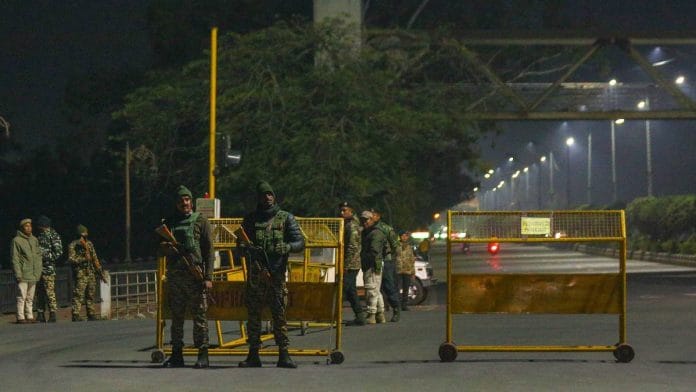New Delhi: In a major outreach to the Kuki-Zo and Meitei communities ahead of Prime Minister Narendra Modi’s likely visit to Manipur next week, the Centre Thursday extended the Suspension of Operation (SoO) pact with the Kuki-Zo armed groups, while also getting a commitment to allow Meiteis to travel freely on a key national highway connecting Imphal to Dimapur, ThePrint has learnt. The two communities have been involved in a bitter ethnic conflict over the past two years.
With the PM likely to visit Churachandpur district in the hills, the extension of the SoO agreement—meaning mutual suspension of operations between armed forces and tribal armed groups party to the pact—is seen as an attempt to assuage the Kuki-Zo community. The pact expired on 29 February 2024.
The Union Home Ministry also secured a signed commitment from the Kuki-Zo Council, the apex civil society organisation representing the community, to allow the Meiteis to travel freely on National Highway-2.
Though NH-2 is not closed technically, Meiteis have avoided travelling on it because of security concerns. They travel by air if they have to go out of the state, which many find unaffordable. The state government did try to normalise the operations but its efforts were not successful. With the PM likely to go to Imphal from Churachandpur, the commitment from the Kuki-Zo Council to allow Meiteis to travel freely on NH-2 is seen as a key step to regain their trust.
If PM Modi’s visit indeed happens, it will be his first since violence broke out in Manipur on 3 May, 2023, following a tribal solidarity march in the hills against the Meiteis’ demand for a scheduled tribe status. Modi’s decision to not visit the state since violence erupted has invited bitter criticism from the Opposition, both inside and outside the Parliament.
A senior BJP MLA in the state, who held a cabinet berth in the Manipur government led by N.Biren Singh before it was dissolved, welcomed the extension of the SoO agreement. “This move is in the right direction. The next step for the Centre will be to install a popular government in Manipur. It will pave the way for bringing normalcy in the state,” the MLA, who did not want to be named, told ThePrint.
The deteriorating law and order situation had led the Centre to impose President’s Rule in the state in February this year. The state assembly was put in suspended animation for 6 months. The President’s Rule was extended again for six months on 12 August.
A government source said Thursday, “The signing to extend SoO agreement took place in front of the Centre’s northeast interlocutor AK Mishra, home ministry officials and representatives of Manipur government in the Ministry of Home Affairs’ new headquarters in Kartavya Bhawan Thursday morning.”
Apart from constituents of armed groups who are part of SoO pact, Kuki-Zo Council representatives were present in the meeting.
Also Read: Manipur crisis is a national failure—a scar on India’s conscience as govt chose to look away
SoO ground rules also renewed
SoO is a tripartite agreement between the Centre, the Manipur government, the Kuki National Organisation (KNO) and the United People’s Front (UPF), which together represented 24 insurgent groups comprising Kuki-Zo, Zomi and Hmars.
It came into force from August 22, 2008 and was meant to end hostilities by initiating political dialogue with the tribal armed groups active in the state and settle demands made by them for a separate homeland.
The pact has to be renewed every year. But after the conflict that erupted in May 2023, the pact was not extended. It lapsed in February 2024. Meetings between the SoO constituents, the Centre and the Manipur government resumed last year and it was decided that the ground rules will be revised to make it “more effective and transparent.”
Under the 2008 agreement, cadres of insurgent groups who came overground were put up in designated camps, called SoO camps. The cadres have to deposit their arms in a safe room inside the camps, which is kept locked. The camps are regularly inspected by security forces.
Besides, the cadre cannot go outside the camps or take arms outside. Those living in SoO camps get a monthly stipend of Rs 6,000 as part of their rehabilitation process.
However, in the new ground rules, the Centre has proposed to transfer the stipend directly to the accounts of individual cadres, subject to the condition that they were present in the camp at the time of monthly inspection by the central security forces, ThePrint has learnt.
The original ground rules also mandated that as long as SoO is in place, security forces—be it central or state—and the cadres in the camp, will desist from launching any operation against each other. This has been retained in the revised ground rules.
The revised ground rules also mandate that the Kuki National Organisation (KNO), the United People’s Front (UPF) and their constituents will “abjure the path of violence” and “abide by the Constitution of India, laws of the land, and territorial integrity of Manipur.”
All the SoO constituents have also agreed to bring down the number of SoO camps, where the cadres of armed groups live, from 14 to 10. The SoO cadre strength in the 14 camps as of February 2024 was 2,181. A physical reverification would also be done of the SoO cadres under the new ground rule being finalised, the government source quoted earlier said.
(Edited by Ajeet Tiwari)
Also Read: 1 killed, 16 injured in Manipur as Kuki demonstrators protest against ‘free movement’ order






